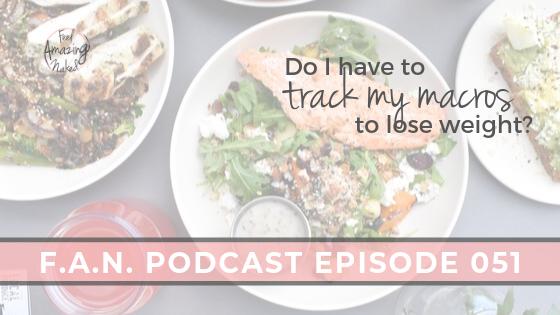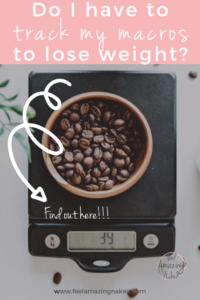If you are a female, you have likely heard about tracking your macros for weight loss. (Macros stand for macronutrients which are the building blocks of food, namely protein, fat, and carbohydrates, and an outlier – fiber.)
Likewise, as a female, losing weight is probably something you at least think about. And for the majority of us, we have been on more than one diet in our lifetimes. Probably more than one in the past year, if we’re honest.
Many of us diet almost all the time, switching from one trendy diet to another, but never finding a way of eating and fueling our body that makes us feel good while also helping to take off the extra weight.
I get it because I’ve been there. I’ve done the diets, lost the weight, gained it all back, and started over. I’ve worked out too much and not enough. And in the end, none of those fad diets or killing myself in the gym changed my body or gave me the confidence I needed to make lasting changes.
My Story of Pain and Progress
When my son was an infant, I became very ill. He was a newborn, I was nursing, and I was in excruciating pain and I was vomiting. I was resistant to getting help because I wanted to be at home nursing my baby but it finally got so bad that my husband insisted we go to the ER.
I was diagnosed with postpartum stress ulcers and they sent me home with pain meds, which I, in turn, refused to take because I was nursing.
They recommended a diet of low acidity, high pH foods, which looked like saltines and bread products. But unfortunately, the cycle kept repeating itself.
Eventually, I found a GI who wanted to get to the root of the issue and I was diagnosed with non-celiac gluten sensitivity. Yeah, I was eating bread to avoid pain and vomiting and I had a gluten sensitivity.
Within 2 weeks, I felt so much better and that started me on the path to learning more about food and how it affects our bodies. My undergraduate degree is in physiology so I understood the body’s systems. Now, I needed to learn how to feed my body in order to be healthy.
Because paleo is the system most recommended for removing gluten, I adopted it and for the most part, I felt great while I was on it. However, although I was eating high-quality foods, I was gaining weight.
And that’s when I hired a health coach, who educated me on caloric balance.
I was working out like crazy; really overtraining, to be honest. And yet I had zero confidence in myself and my relationship with food was still so unhealthy. I was very much a food elitist – “If you don’t eat paleo, you’re just wrong.” I never said it, but I sure thought it.
And then, I started tracking my macros. My health coach helped me to understand that I could be eating the highest quality foods on the planet but still not be changing the composition of my body.
In order to learn more, she invited me to come on as her intern, and it was while working with clients on tracking their own macronutrient targets that my own coaching business was born.
What Would a Healthy Relationship with Food Look Like?
As I worked with clients, my work focused on helping them reach their macronutrient targets but there was more to it for me.
I knew that tracking macros wasn’t enough. I also saw the need to make sure that my clients, and myself, were getting the micronutrients we needed while meeting our macro targets. I saw people saying they were meeting their macro targets while eating junk food and I knew that wasn’t the right way to think about macros at all.
But as I became more disciplined in my own eating, I began to rely too much on tracking my macros. The process itself became almost a crutch for me.
I still didn’t have a healthy relationship with food; I had merely learned how to control it. I wondered what a healthy relationship with food would look like for me.
See, I was at the perfect body composition number but I still wasn’t happy. I wasn’t confident. And I definitely wasn’t fulfilled.
You Can’t Find Fulfillment by Tracking Macros
Is that headline amusing to you? Read it again. Do you agree?
Too many people are looking for fulfillment in the wrong places. Kinda like that old country song about looking for love in all the wrong places. We are trying to learn to love ourselves and we think that if we get to the size jeans we dream of, we will love ourselves and we’ll feel fulfilled.And I’m here to tell you ladies, that’s not how it works.
There is no pair of jeans that will change how you feel on the inside.
I knew there had to be more than tracking macros so I started experimenting with my clients.
We stopped tracking macros and added some new practices to our coaching sessions.
So, if you’re ready to move away from being dependent on relentless tracking, let me show you a better way.
Why Long-Term Macro Tracking Isn’t Helpful
If you are curious about tracking your macros, let me share with you some reasons why I believe it isn’t beneficial in the long-term.
Gotta Hit That Target
First, tracking macronutrients is simply a way to hit targets in an app.
Listen to me, we don’t eat to hit some magic number. Our bodies were created to need fuel and food is that fuel. One of the reasons I don’t like long-term tracking of macros is that it disconnects us from what our bodies actually need.
We start eating to meet a number instead of noticing our hunger signals.
Could the App Be Wrong?
Secondly, apps can’t get the numbers exactly right. You are a unique person with specific needs. An app may inflate your targeted needs which may cause you to overeat. Can you learn things about food by tracking macros? Absolutely.
But you have to have some understanding of food quantities and amounts for it to be beneficial.
To Tell the Truth
Another problem I see with tracking to a target is that we sometimes lie. Oh yes, hear me on this one.
If it’s 11 p.m. and you just couldn’t resist that piece of cake before bed, what are the actual chances of you writing it down or entering it into the app? For a lot of us, not much. And then we wonder why we aren’t making progress.
Well, it’s because we aren’t being honest with ourselves.
This is where I see the most progress with my coaching clients – digging into these kinds of behaviors that we don’t want to admit but that are holding us back from real progress.
Ways to Successfully Use Macro Tracking
Just because it may not be the best long-term tool in your weight loss arsenal doesn’t mean it isn’t helpful at all. There are definitely reasons to use it, so let me share a few of those.
Ready to Hit the Next Level?
Let’s talk about an example of when tracking macros might be helpful. If I am working with an athlete who has already lost weight, but has hit a plateau and needs to get to that next level, tracking macros can be very helpful.
It can also be a very helpful tool for someone who needs to gain weight. But I currently believe that only those with a high level of experience should track macros and even then, only if they have a solid foundation.
Don’t Leave Your Body Behind
Macro tracking can be helpful if you can remember not to allow it to disconnect you from your body.
If you are the type to become obsessed with the numbers, if you have a panic attack when you eat 2 grams instead of the 5 grams you meant to eat, it is not helpful for you. But if you can dabble in it to learn more about food, then we can use that skill for your long-term good.
Here is my “motto,” if you will, on what a real diet should look like-
“Eat real food, and lots of veggies for micronutrients, in a balanced portion, in relationship to your activity level.”
Are You Dependent on a Crutch?
Tracking macros isn’t the only crutch in the weight loss arena. Not by far.
What I focus on in my coaching practice is figuring out why you are dependent on any crutch and how we can move you past it to regaining your confidence and developing a healthy relationship with food.
My goal is to help you get the rest of your life and self-care in place so that you can begin to recognize and deal with the underlying issues that cause you to eat the chocolate cake before bed every night.
There Is an Easier Way
I’m seeing the women I coach find massive success, not only in weight loss, but in their energy levels, their levels of confidence, and their relationship with food.
So, what’s the magic answer? That’s the million-dollar question, right? I hear it every time I sign on a new client. And the answer is, there is no magic answer. There is no one way of eating of tracking that will guarantee you weight loss and confidence and self-love.
But if we figure out the underlying issues, the rest will come. And in the meantime, intentional eating and building a balanced plate will begin to get you headed in the right direction.
The 5 Areas You Must Address
- Are you proactive or reactive when it comes to food?
- Are you grounding yourself before the week begins?
- Are you creating a meal plan or just eating whatever?
- Do you know your triggers for overeating or eating junk?
- Do you have any outside accountability?
Tracking macros isn’t the way to long-term success. You have to learn to coach yourself through the reasons you overeat or don’t eat good food.
There may be many layers of this onion that you have to peel back before you get to all the root causes. If you don’t know where to start, I am here to help.
Schedule a FREE Deep Dive call with me here.
XO,
Amanda
Thank you for listening and reading lovely! How can you support this podcast?
- Apple users, please subscribe and review our show on Apple Podcasts, we make sure to read them all. Android users, be sure to subscribe to our show on Stitcher. As a subscriber, you will get a notification each week a new episode drops! (man I love saying, “Drops”).
- Tell a friend about The Feel Amazing Naked Podcast…they will love you for it! T
- Join the Feel Amazing Naked Community (FREE). I am in here LIVE each week sharing tips, cooking and talking all things confidence and growth.
- Follow me on my favorite social media platform, Instagram.
- Share using the buttons above and don’t forget to tag me (@awalkmyway and @feelamazingnaked) when you do!


